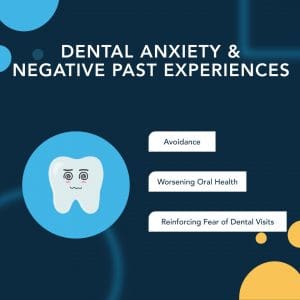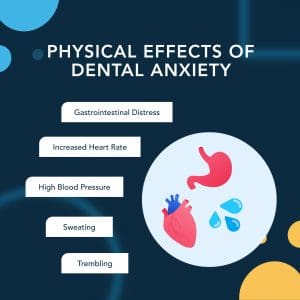Dental anxiety is a common challenge that prevents many individuals from seeking necessary dental care and potentially compromising their oral health. The mere thought of a dental visit can evoke fear and stress, making it a daunting task for those affected.
However, overcoming dental anxiety is necessary for maintaining optimal dental health and ensuring a beautiful, healthy smile. From understanding the root causes of dental anxiety to exploring relaxation techniques and the benefits of open communication with dental professionals, we’ll guide you through a series of steps designed to help you feel more comfortable and confident about your next dental appointment.
What is Dental Anxiety?
Dental anxiety refers to the fear, stress, or unease individuals experience at the thought of visiting a dentist. This condition varies in intensity among individuals, ranging from slight nervousness to severe phobia, and can lead to avoidance of dental care. Understanding and addressing dental anxiety is critical for ensuring access to necessary dental treatments and maintaining oral health.
Common Triggers of Dental Anxiety
Dental anxiety can be triggered by various factors such as past traumatic dental experiences, fear of pain or discomfort, unpleasant sounds and smells associated with dental offices, fear of needles or drills, and embarrassment about one’s oral health. Additionally, anxiety can stem from a sense of vulnerability or a feeling of losing control while sitting in the dental chair, leading to a reluctance to seek dental care.
Fear of Pain
The fear of pain is a significant trigger of dental anxiety for many individuals. This fear often stems from past dental experiences or hearing about others’ painful procedures. It can lead to a heightened apprehension about undergoing dental treatments, even routine cleanings, based on the anticipation of discomfort or pain.
Negative Past Experiences
Negative past experiences at the dentist can deeply root dental anxiety in individuals. Traumatic or painful dental visits, perceived neglect, or insensitive treatment by dental professionals can leave lasting impressions, making the thought of future appointments daunting. These experiences can create a cycle of avoidance, worsening oral health and reinforcing the fear of dental visits.
Feeling of Loss of Control
The feeling of loss of control is a common trigger of dental anxiety. Lying in a dental chair, unable to see what’s happening, and feeling vulnerable, can be unsettling. This lack of control over one’s environment and the unpredictability of procedures can significantly heighten anxiety, making dental visits particularly stressful.
Embarrassment
Embarrassment about oral health is another prevalent trigger of dental anxiety. Individuals may feel self-conscious about the condition of their teeth or breath, fearing judgment from dental professionals. This embarrassment can deter them from seeking necessary care, exacerbating dental problems and reinforcing the cycle of anxiety and avoidance associated with dental visits.
Needle Phobia
Needle phobia, the intense fear of needles, is a common trigger of dental anxiety, particularly in procedures requiring local anesthesia. The anticipation of needle use can evoke significant stress and fear, leading some individuals to avoid dental appointments altogether, potentially compromising their oral health due to untreated conditions.
Financial Concerns
Financial concerns can significantly contribute to dental anxiety, with the cost of treatments causing stress and worry. The fear of facing expensive procedures or the uncertainty of insurance coverage can deter individuals from scheduling dental visits, potentially leading to delayed care and exacerbating oral health issues that become more costly over time.
Physical Effects of Dental Anxiety
Dental anxiety can cause intense physical effects, such as increased heart rate, high blood pressure, sweating, trembling, and gastrointestinal distress. Some people may even feel dizzy or faint at the thought of going to the dentist. These physical symptoms not only make the dental experience more difficult but also discourage people from seeking essential dental care.
Increased Heart Rate
An increased heart rate is a common physical effect of dental anxiety, as the body’s natural response to stress triggers the fight-or-flight reaction. This heightened cardiovascular activity can make individuals feel palpitations or a pounding heart, intensifying their anxiety and making the dental visit seem more daunting than it might otherwise be.
 High Blood Pressure
High Blood Pressure
High blood pressure is another physical manifestation of dental anxiety. The body’s stress response can cause a temporary spike in blood pressure as individuals anticipate or undergo dental procedures. This physiological reaction not only exacerbates feelings of anxiety but can also pose challenges for dental professionals managing patients under stress during treatments.
Panic Attacks
Dental anxiety can cause panic attacks, which are severe physical reactions characterized by overwhelming fear, heart palpitations, shortness of breath, dizziness, and a sense of impending doom. These intense reactions can occur before or during a dental visit, making it difficult to receive necessary dental care and worsening the cycle of anxiety.
Dry Mouth
Dry mouth, also known as xerostomia, is a common physical response to dental anxiety. When the body experiences stress during dental procedures, it can result in a decrease in saliva production, leading to dry mouth. This can make the experience of dental work more uncomfortable and make it harder to speak clearly, which in turn can contribute to an increased sense of anxiety during dental visits.
Strategies to Reduce Anxiety Before a Dental Visit
Being prepared with strategies before a dental visit can greatly reduce dental anxiety. These strategies can include relaxation techniques, gathering information about the procedure, or establishing a signal with your Davie dentist for breaks during treatment. By taking proactive steps, patients can make the dental experience more manageable and less intimidating.
Research & Choose Your Dentist Carefully
Researching and carefully choosing your dentist is a crucial step in managing dental anxiety. Look for a dental professional who is experienced in treating anxious patients and has positive reviews for their gentle approach and good communication. A dentist near me who prioritizes patient comfort can make a significant difference in creating a more positive and less stressful dental experience.
Schedule a Consultation
Scheduling a consultation before the actual dental treatment can be an effective strategy to manage dental anxiety. This preliminary visit allows you to meet the dentist, discuss your fears, and familiarize yourself with the environment without the pressure of undergoing treatment. It sets the stage for building trust and understanding, making subsequent visits less daunting.
Inform Your Dental Team
If you experience anxiety before a dental visit, it is a good idea to inform your dental team in advance. This will help them to customize their approach and provide you with extra care and understanding during the visit. They may use various techniques to make you feel more comfortable, such as explaining each step of the process or allowing for breaks. By doing so, they can create a more reassuring dental experience for you.
Educate Yourself
When you’re about to undergo a dental procedure, educating yourself beforehand can help reduce anxiety. Knowing the steps involved in the process can demystify it and dispel any unfounded fears you may have. This knowledge can give you a sense of control, reducing the fear of the unknown and making your upcoming dental visit feel more manageable and less intimidating.
Discuss Sedation Options
If you experience dental anxiety, discussing sedation options with your dentist can be an essential strategy to manage it. Sedation dentistry provides different levels of sedatives, ranging from mild to profound, depending on the severity of your anxiety. Knowing that sedation is an option can help to alleviate your fears, making the visit more bearable and less stressful.
Plan Your Appointment at a Low-Stress Time
Planning your dental appointment during a low-stress period can be an effective way to manage dental anxiety. You can choose a day and time when you’re not likely to be rushed or stressed from other commitments. Approaching your dental visit with a calm, unhurried mindset can significantly reduce anxiety levels, resulting in a more relaxed and positive experience.
Practice Relaxation Techniques
Practicing relaxation techniques before a dental visit can effectively reduce anxiety. Deep breathing, progressive muscle relaxation, or guided imagery are some techniques that can help calm nerves and lower stress levels. If you incorporate these practices into your routine before appointments, you may notice a significant difference in your comfort level and overall dental experience.
Plan a Reward
Planning a reward for yourself after a dental visit can serve as a positive motivation to overcome dental anxiety. Whether it’s a favorite treat, a relaxing activity, or a small gift, having something to look forward to can help shift your focus from anxiety to anticipation of the reward, making the dental experience more bearable.
Wear Comfortable Clothes
Wearing comfortable clothes during a dental appointment can improve your sense of well-being and reduce anxiety. Comfortable attire can make you feel more relaxed and less constrained while in the dental chair, ultimately contributing to a calmer state of mind. This easy but effective strategy can help you have a more pleasurable dental visit.
Arrange Support
Having someone you trust accompany you to your dental appointment can be an effective way to manage dental anxiety. This supportive presence can provide comfort, reduce feelings of isolation, and offer reassurance. It can also make the experience less daunting and more manageable, especially for those with severe anxiety.
Techniques to Reduce Anxiety During the Appointment
In addition to preparing before the dental appointment, there are several techniques that can reduce anxiety throughout the experience. Techniques that focus on relaxation and distraction can help soothe nerves and create a calming environment. Such strategies are not only beneficial for easing immediate anxiety but also for fostering a more positive association with dental care in the long run. By integrating these practices, patients can significantly improve their comfort and reduce anxiety during dental visits.
Use Deep Breathing Techniques
Using deep breathing techniques during the dental appointment can significantly alleviate anxiety. Focusing on slow, deep breaths helps lower heart rate and relax muscles, counteracting the body’s stress response. This practice can shift your focus away from anxiety, promoting a sense of calm and making the dental experience more manageable.
Listen to Music or Audiobooks
Listening to music or audiobooks during a dental appointment can be a highly effective way to manage anxiety. This distraction technique allows you to immerse yourself in soothing sounds or engaging narratives, shifting your focus away from the dental procedures. It creates a more relaxed atmosphere, helping to ease tension and make the experience more pleasant.
Establish a Stop Signal
Establishing a stop signal with your dentist is a practical way to manage anxiety during dental procedures. This prearranged gesture or word gives you the power to pause the treatment whenever you feel overwhelmed, providing a sense of control. Knowing you can stop at any time helps reduce fear and makes the dental experience more bearable.
Opt for Sedation Dentistry
Opting for sedation dentistry can greatly reduce dental anxiety by using medication to help you relax during procedures. Available in various forms, from mild sedatives to general anesthesia, sedation allows for a more comfortable and stress-free experience. Discussing sedation options with your Davie dentist can help you choose the right level of sedation to meet your needs and alleviate anxiety effectively.
Communicate with Your Dentist
Communicating openly with your dentist is crucial for managing dental anxiety. Discussing your fears and concerns allows the dentist to tailor their approach, ensuring they proceed with extra sensitivity and understanding. This open dialogue helps build trust and can lead to adjustments in treatment methods that make the dental experience more comfortable for anxious patients.
Remind Yourself of the Positive Outcome
When you feel anxious about visiting the dentist, it can be helpful to remind yourself of the positive outcomes. Focus on the benefits of going to the dentist, such as improved oral health, a brighter smile, and prevention of future dental problems. Keeping these positive aspects in mind can help shift your perspective and make the experience more about the rewards rather than the process.
Schedule Your Next Dental Checkup Appointment
Scheduling your next dental checkup is essential for maintaining good oral health and catching any issues before they become severe. Regular dental visits to your local Broward County dentist allow professionals to clean your teeth thoroughly, check for signs of decay or gum disease, and provide necessary preventive care. Call our office to schedule your next dental checkup with a dentist in Davie, Florida.
July 12, 2024

 Adult
Adult




 High Blood Pressure
High Blood Pressure